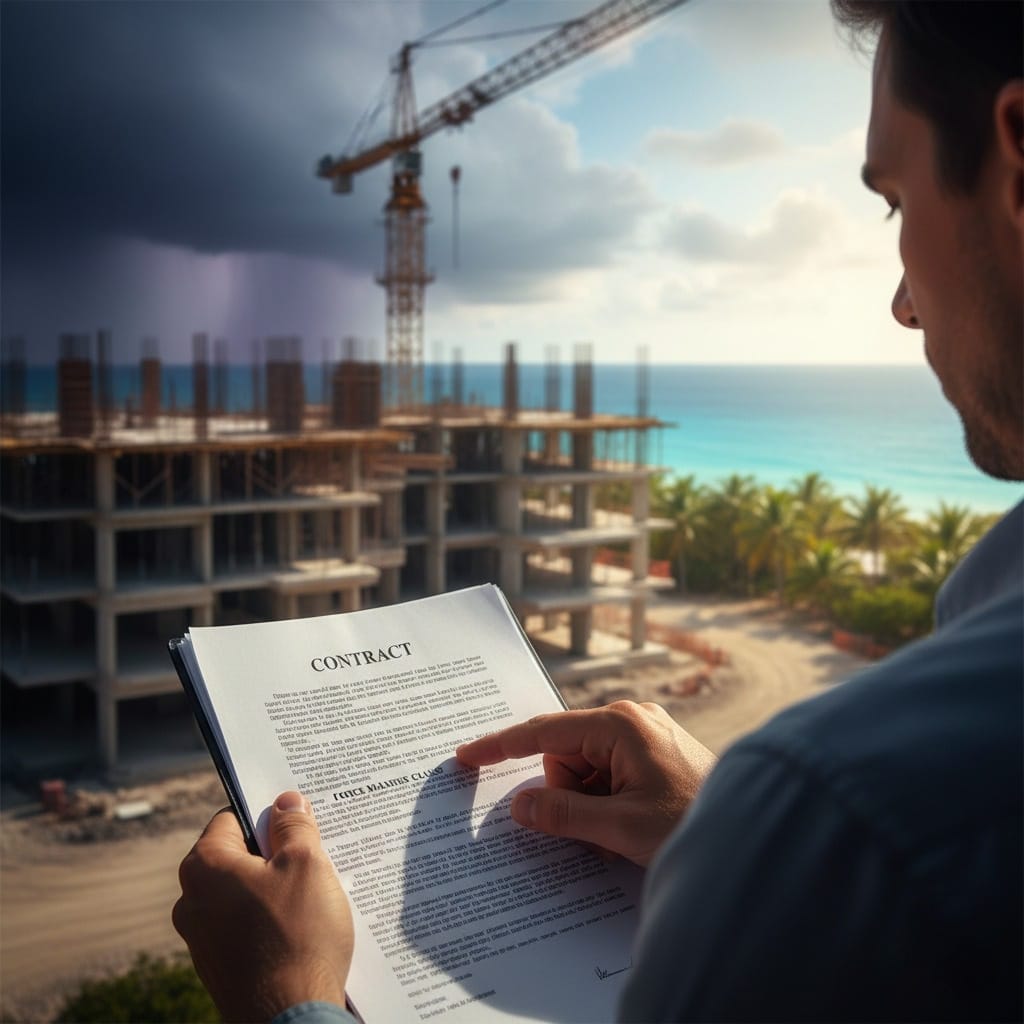Force Majeure or Developer Excuse? How to Protect Your Property in Riviera Maya
Understanding the ‘Act of God’ gambit is critical to protect your property in Riviera Maya from costly developer delays.
You have invested in the Mexican Caribbean dream. You found the perfect condo in Playa del Carmen or a stunning new build in Tulum. Then, an email lands in your inbox. Your developer claims a “force majeure” event has occurred. As a result, your project is delayed indefinitely.
But is this a genuine “Act of God,” or is it a convenient excuse for poor planning?
For foreign investors, this situation is more than an annoyance. It is a direct threat to your investment. At PeninsuLawyers, we specialize in real estate dispute resolution. We have seen this scenario many times. While true force majeure events exist, the term is often misused. It can become a shield for mismanagement, budget problems, or avoidable delays.
This article will help you understand this legal concept. More importantly, it will teach you how to challenge its misuse. Knowledge is your first and best step to protect your property in Riviera Maya.
What Is Force Majeure in Mexico?
In Mexican law, force majeure (superior force) and its legal cousin caso fortuito (fortuitous event) are legitimate concepts . They can legally excuse a party from fulfilling a contract. However, the standard is very high.
For an event to truly qualify, it must meet four strict criteria:
- It must be unforeseeable. The event could not have been reasonably predicted when the contract was signed .
- It must be unavoidable. Even if it could be foreseen, its consequences were impossible to prevent or overcome .
- It must be external. The cause must be completely outside the developer’s control. It cannot be the result of their own negligence, error, or mismanagement .
- It must make performance impossible. This is the most critical test. The event must make fulfilling the contract physically or legally impossible. It cannot just make it more difficult, more expensive, or slower .
A massive hurricane that destroys the site might qualify. A government shutdown of all construction for a pandemic would also likely qualify. However, a typical rainy season, even a heavy one, would not.
The Developer’s “Orchestra of Excuses”
We often see developers claim force majeure for issues that are simply normal business risks. This is where you must be skeptical. Being ableRead-y to identify these weak arguments is a key strategy. It is how you protect your property in Riviera Maya from the start.
Here are the most common excuses we see, straight from Chapter 19 of our legal guide :
The “It Rained Too Much” Excuse The Riviera Maya is a tropical climate. It has a well-known rainy season. Developers are expected to plan for this . Normal seasonal weather, even if it is severe, is foreseeable. Therefore, it is a normal business risk, not a force majeure event .
The “Supply Chain” Gambit Your developer might blame material shortages or price hikes . While global supply chains can be disrupted, these issues rarely make performance impossible. They usually just make the project more expensive for the developer. This is their risk, not yours . Poor planning is not an Act of God.
The “Permit Purgatory” Blame This is a classic excuse. The developer claims the government is delaying permits . However, these delays are often the developer’s own fault. They may have filed incomplete applications. They might have failed to meet clear regulations . This is a lack of diligence, not force majeure.
The “Labor Pains” Excuse You may hear about labor strikes or a shortage of skilled workers . Unless this is part of a massive, region-wide event, managing labor is a standard part of the construction business .
The Burden of Proof Is on the Developer
Here is a crucial point many investors miss. You do not have to disprove the developer’s claim. The developer bears the burden of proof .
If they claim force majeure, they must provide you with evidence. They must prove that a specific event occurred. Furthermore, they must prove that this single event meets all four of the strict legal tests. You have the right to ask for this proof. In fact, you should demand it in writing .
Is It “Force Majeure” or “Hardship”?
Sometimes, a situation arises that is not force majeure but is still a major problem. Mexican law has another, more complex concept called teoría de la imprevisión, or “hardship” .
This is different from force majeure.
- Force Majeure = Performance is impossible.
- Hardship = Performance is not impossible, but an extraordinary, unforeseeable event has made it much more burdensome or expensive .
A developer might try to use this concept to renegotiate the contract terms. For example, they may try to raise the price. This is a very complex legal area. If your developer mentions this, you must contact a lawyer immediately.
How to Protect Your Property in Riviera Maya Before You Sign
The best defense is a strong offense. You can protect yourself by having a very strong contract. This is where an independent lawyer is not a luxury, but a necessity.
Your lawyer should fight for these key protections in your contract:
1. A Narrowly Defined Force Majeure Clause Your contract must be specific. It should list the exact events that qualify (e.g., earthquakes, tsunamis, widespread government shutdowns). More importantly, it should list what is excluded. Your contract should state that normal weather, material price hikes, and permit delays are not force majeure events .
2. Clear Developer Obligations What happens if a real force majeure event occurs? The contract must state the developer’s duties. They must provide you with prompt written notice. They must provide verifiable evidence. And they must show what they are doing to mitigate the delay .
3. An “Escape Hatch” (Long-Stop Date) This is your most important protection. Your contract must include a “long-stop date.” This clause says that if a delay (even a legitimate one) continues for a certain period, you have the right to act. For example, if the delay lasts more than 12 months, you should have the right to cancel the contract. This allows you to receive a full refund . This prevents your money from being trapped in a failed project forever.
What to Do if You Get a Force Majeure Notice
If you receive that dreaded email, stay calm and act strategically.
- Acknowledge, Do Not Agree. Send a brief reply. State that you have received their notice. Do not, under any circumstances, write that you “understand” or “agree.”
- Request Evidence. Ask the developer to provide formal, written evidence of the force majeure event. Ask them to explain how this event makes performance impossible.
- Call Your Lawyer. This is the most critical step. Do not try to negotiate this alone. Send all the documents to your independent legal counsel. Your lawyer will analyze the claim against your contract. They will determine if the claim is valid or just an excuse.
A developer’s failure to plan is not your emergency. Your investment is too important to leave to chance.
Facing a force majeure claim or developer dispute in the Riviera Maya? Don’t navigate it alone. Contact PeninsuLawyers to protect your investment and secure your property rights.



